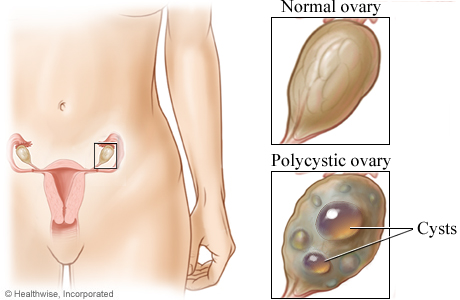Many women may know that polycystic ovary syndrome (PCOS) is a complex endocrine and metabolic abnormalities caused by the disease, great harm, can make women hair loss, hirsuty, obesity, irregular menstruation and even infertility.
Women with the disease of polycystic ovary, biological mothers and sisters tend to have a higher prevalence than ordinary women. Medical studies have found that polycystic ovary syndrome has three characteristics, respectively: racial orientation, family aggregation, twin similarity.

The high familial aggregation of PCOS suggests that genetic factors play an important role in the pathogenesis. The study of genetic risk factors of PCOS can provide scientific basis for reducing its incidence and preventing its complications. Pedigree analysis showed that PCOS was inherited in an autosomal dominant manner, but the diversity of clinical manifestations of PCOS limited the identification of pedigree patients, and the lack of male phenotype prevented gene linkage analysis from playing an effective role.
Hyperandrogenemia and insulin resistance or hyperinsulinemia are the two main features of PCOS.
A large number of studies have confirmed that insulin resistance or hyperinsulinemia is the initial and dominant factor in the occurrence and development of essential hypertension, and hyperandrogenemia can aggravate the existing insulin resistance in patients with polycystic ovary syndrome. And vice versa. It’s a vicious cycle.
Therefore, PCOS patients had a significant tendency to hypertension at a young age, and the incidence of pregnancy-induced hypertension was also significantly higher than that of the control group. Current family analysis and experimental studies have shown that. There are independent factors for hyperandrogenemia and hyperinsulinemia in patients with PCOS, which may be determined by different single gene abnormalities.
From clinical observation, PCOS patients often have irregular menstruation of the mother and/or sisters, also often have early bald father and/or brothers, genetic characteristics are very obvious.
To sum up, the thorny problem of polycystic ovaries runs in families. The intractable problem of polycystic ovary has certain familial heritability. The intractable problem of polycystic ovary disease is related to genes, so it has certain familial heritability. Some female friends are inherited from their fathers, others from their mothers, and some may be inherited from other families. In general, if the parents have high blood pressure or a history of diabetes, the mother or father of the endocrine disease, for children, there is a possibility of polycystic ovary syndrome, a difficult problem.